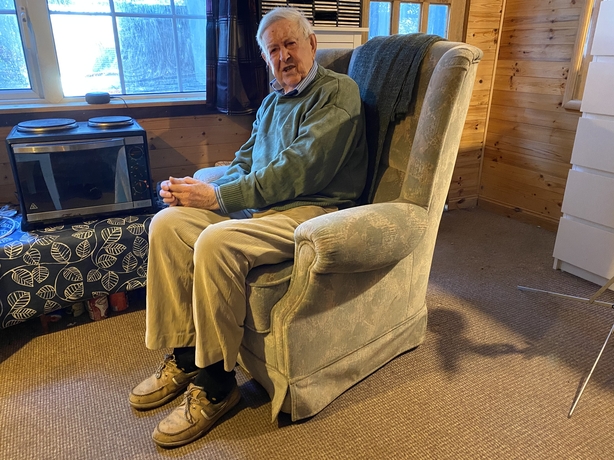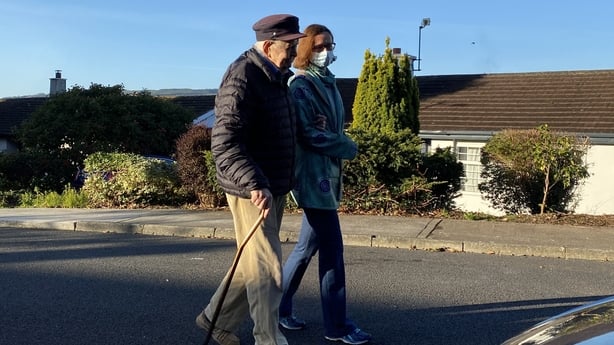Carers' organisations have called for guidance on how almost five million extra home care hours are to be provided over the next six months.
The 25% expansion of services between now and April was announced in the Health Service Executive's Winter Plan published last week.
It sets out plans to have 4.7 million additional home care hours in place by next April.
But carers' groups say the Department of Health and the HSE have not worked out how they are going to deliver the extra hours.
They have called for guidance around implementation.
Joseph Musgrave, CEO of Home Community Care Ireland (HCCI), described Covid-19 as "an earthquake" in relation to how we care for older and vulnerable people.
"We've crunched the numbers and we think we're going to need about 6,000 carers just amongst HCCI alone. That means the HSE are going to have to hire 4,000. That means a workforce of 10,000.
"So, how's that going to happen we don't know. We've proposals ready, but no one is talking to us about how we're going to get this done. We need Government to lead a social care workforce review," said Mr Musgrave.
The concerns have been raised on United Nations International Day for Older People.
The Minister with responsibility for Older People has said she is confident that home care supports set out in the plan will reduce waiting lists.
Mary Butler said she is confident that almost five million hours can be accommodated as outlined in the Winter Plan.
"It sounds like a huge number of hours, but we've 60,000 people in Ireland dependent on home care supports so if that means each person gets an extra, they get an extra three or four hours a week, so it's doable.
"I don't want people to be on a waiting list any longer if they need those extra supports".
I'd be lost outside the door without carer, says older blind man
Brian Rothery is an 86-year old man whose carer visits him six days a week.
It is difficult to define his technological prowess. Is he a YouTuber or a podcaster? Either way, he is recording himself and preparing to release his thoughts and reflections on Spotify.
Technology has always been part of Brian's life. His first job was with IBM in the 1960s before he moved into publishing.
It was long before voice-led technology like the Alexa landed in sitting homes. He describes "her" as "unbelievable".
Alexa times his dinners, he uses her as an alarm and he throws the odd curveball question at her like "Alexa, are you mad with me". She rarely is.

Voice-led technology is important to Brian. He lost his sight 18 months ago. When his wife died nine years ago, he was already having difficulty and attending the Eye and Ear Hospital in Dublin.
"Finally, 18 months ago when I lost the sight and I was living in a fairly remote farmhouse in Co Wexford, I knew I couldn't [be] there any longer because I couldn't see the food in the fridge."
He moved from Wexford to Dublin, to live beside his daughter Gráinne. Fearing he may be a burden, he called the local public health nurse who he says was his fairy godmother.
She succeeded in a number of "miracles", including linking him with the National Council for the Blind, a volunteer from Alone and his carer Natali Kocijan who visits him six mornings a week.
Natali plays a very important role in Brian's life. Apart from the affection, the companionship and the help she gives him, he explains that he can only go outside with Nathali or Gráinne his daughter "because I'd be lost outside the door".
"Nathali was in publishing in her former life in Bosnia so I talk to her about my podcast ideas and I rehearse with her."

The impact of Covid-19 on congregated settings, particularly nursing homes, means the Government and HSE are keen to see more people like Brian cared for at home.
Mr Rothery said the only concept he has of the coronavirus is what he hears on the radio. He cannot see people wearing masks.
"I was blind for a year before Covid so I was largely isolated for 12 months beforehand."
The biggest change was that the friends who took him for coffee could not come anymore.
"At my age, at 86, it's like being on death row. I've had 85 years of a good life and I know I'm being looked after. Gráinne and Nathali are protecting me from any exposure so I feel safe."
In the meantime, he is keeping himself occupied preparing his podcasts.
"I have to rehearse it, so I can occupy myself for a whole week preparing it and getting it off by heart."
"Between listening to the radio and planning podcasts, it keeps me intellectually stimulated," he said.







